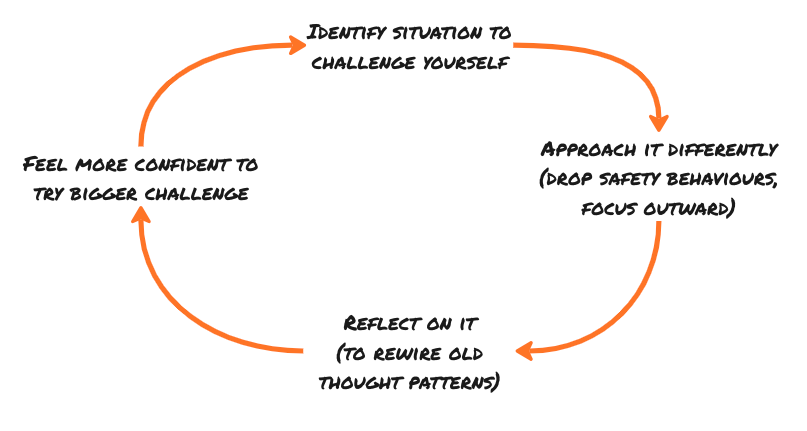Introduction to social anxiety self-help
We help you overcome social anxiety. We do it by providing a simple process, amplified by the support of a group. Groups are at the heart of our approach. They give you the wisdom to understand your anxiety and the confidence to try new things, rewiring your habits for good.
We believe that the key to overcoming social anxiety is to approach situations in new ways, seeing what happens and reflecting on what you learn. We call them ‘challenges’. Approaching situations in new ways means:
- Dropping your ‘safety behaviours’ (including avoidance)
- Focusing outwardly (rather than inwardly)
It’s not easy, but you are capable. Exercises below will help you prove it to yourself. This easy-to-follow guide and templates, together with the support of your group, will give you the know-how and confidence to maintain it.
As you embark on this journey, remember that change takes time. Be patient with yourself and celebrate each small victory along the way. With perseverance and dedication, you can reclaim your life from the clutches of social anxiety and live with greater confidence and freedom.
Please also remember: this is our approach that we find helpful. It’s not for everyone and isn’t a substitute for 1-1 professional support. If you feel you need it or are worried, always seek professional help.
Let’s get started!

How to overcome social anxiety: the basics
The WalkTheTalk process is a self-guided programme. It’s based on cognitive therapy for social anxiety disorder (CT-SAD). It’s been adapted for a group setting and includes additional exercises and resources that we’ve found useful (as WalkTheTalk members).
As social anxiety is something managed and not ‘fixed’, the process emphasises continued maintenance, not just a limited number of sessions. Having said that, the goal isn’t that you stick around forever, but that you use it for as long as you need it and you become confident in how you’re able to self-manage.
The core of the process
The core of the process is simple: you identify a challenge, you approach the situation in a way that drops your safety behaviours while focusing your attention outwards and you return to the group to celebrate or to help you if you’re struggling. By continuing this loop you gradually take on more challenges and become more confident over time.

It’s simple in theory, but not so simple in practice. The motivation and support you get from your WalkTheTalk group is the reason why it’s so powerful.
Aids to help you along the way
On top of this easy-to-follow guide, we give you aids to make the process easier.

Peer support group
A safe and supportive space where you can connect with others who understand what you’re going through. Your peers will cheer you on, help you overcome obstacles, challenge your negative thoughts, and keep you motivated. ‘Practice’ on your group and with buddies.

Journal
Write down what your challenges, track and reflect on your progress, and rewire deep-rooted beliefs.

Daily challenges
An email with a quick challenge to put you out of your comfort zone. Build confidence with new things to try each day.

Training and learning resources
Videos and articles to help you train outward attention, identify safety behaviours, practice in-the-moment coping techniques and more.
Some general tips as you follow the process
- Recognise that we are each on a spectrum. No two people with social anxiety are the same. You have your own unique experiences, situations, signs and symptoms and pace of development. All of that is fine.
- Resist the compulsion to compare. Only compare yourself to your own progress from yesterday.
- The most important thing is that you make progress. Don’t get discouraged if you don’t see results immediately. Just keep working at it.
- Try to not set expectations. The goal of the process is to avoid avoiding situations (‘overcome’ social anxiety) and not to suddenly enjoy being the centre of attention at a party or asking a stranger for something.
Remember, everyone’s journey is different. Be patient and persistent. Overcoming social anxiety takes time and effort. But with hard work and dedication, it’s possible!
Experience for yourself: your first challenge
We’ve identified that the key to overcoming social anxiety is to challenge yourself to approach situations in new ways and reflect on your experience in a way that aims to rewire old habits. Each completion of this cycle represents one ‘challenge’.
Your first session at WalkTheTalk is the perfect way to experience it for yourself. Here’s how.
1. Find and join a WalkTheTalk group
You’re not alone in this. There are people who understand what you’re going through and want to help. Find and join your WalkTheTalk group if you’ve not already.
2. Prepare for your first session as if it were a ‘challenge’
To engineer each challenge in a way that helps rewire old habits, we use a series of questions split into two sections – before the challenge and after. Think of it like an experiment. We’re making predictions based on what we think will happen with our legacy mindset, we try it out and then report back based on what really happened and how feel about it after trying.
Find a notebook and pen. Before the session, jot down answers to these questions:
What I’m planning to try…
Describe the situation you are experimenting with – in this case, turning up to your first session, meeting a group of strangers and if you feel up to it, introducing yourself to them (i.e. by not avoiding the situation and attending this new group we’re doing something differently).
Why I’m doing this…
Use your own personal motivation here. This connects with your goals to help give you the strength to carry it through.
What I think will happen…
Your thoughts, feelings, behaviours – be specific.
You’ll come back to this later, so put the notebook somewhere safe.
3. Go to the WalkTheTalk session and challenge yourself
By now you’re in touch with the group facilitator who has introduced themselves to you. The group session will be a safe and supportive environment where you can share your experiences, practice and grow following this process – at your own pace. It could be a life-changing experience.
You’ll listen in as the facilitator leads the group, checks in with returning members and at a suitable point will ask if you’d like to introduce yourself. There’s no obligation to speak (or if your meeting is online, to come off of mute or show your camera). You’re in control.
4. Reflect on the experience of the challenge
Grab your notebook from before. Now you’ve turned up to your first session, it’s time to reflect on your experience. The second part of the template emphasises forming healthier habits.
As before, answer these questions:
What actually happened was…
Write down what you experienced at your session. The more detailed the better for future reflection.
A note to myself about what I learned from this…
The wisdom you’d like to take away from this moment. Imagine your future self reading this back for motivation. Capture the essence of how you’re feeling now and how the feeling compares to what you thought would happen.
I challenge my future self to now try…
What do you believe you’re capable of doing next?
Sincerely, well done on completing your first challenge. It can take great effort to show up and you’ve done something that most people wouldn’t – facing a situation that (probably) induced anxiety.
Over time, the more challenges we complete, the more our confidence grows. The bigger the challenge we’re willing to take on and the more progress we make in our quest to overcome social anxiety.
The reality is our challenges will lie outside of our group. You’ll find your group helpful to give you the motivation and support to go into the ‘real world’ and approach situations as you have done just now.
This approach should take you a lot of the way there, but of course there is nuance. We’re all different, experiencing social anxiety in different ways and different approaches appeal to us. We’ll touch on some of these approaches in resources on the website and in group discussion. Use this process in a way that suits you. Many use it alongside 1-1 therapy of all varieties.
Read on to dig into more detail of each of the components of the challenge cycle find additional resources that go deeper into each section.
Something missing?
If you have tips, resources or anything to add, let us know.
With thanks to all the sources referenced and linked to for producing such helpful guidance and resources available to the public and in a way that we’ve been able to use them to create the WalkTheTalk guide. Most notably OxCADAT. Any errors and omissions are our own. Please note the information provided shouldn’t be taken as medical advice. We’re a peer support group sharing content and support that we hope will prove useful. If you feel you need it, always seek professional support from your GP/the NHS and/or therapist.

